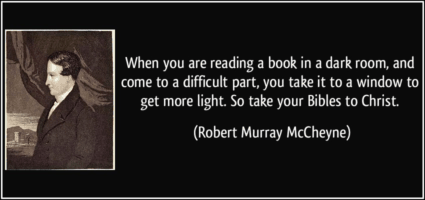
Memoir & Remains of Robert Murray M’Cheyne
On this episode of 5 Minutes in Church History recorded live at Ligonier’s 2018 National Conference, Dr. Stephen Nichols asks Dr. Sinclair Ferguson to share his favorite figure from Scottish church history.
Stephen Nichols: Today, I am joined, once again, with a dear friend of mine—actually, a former professor of mine when I was in seminary—my favorite Scotsman, Dr. Sinclair Ferguson.
Sinclair Ferguson: It’s true, we were at seminary together.
SN: We were at seminary together. I believe you were the professor, and I was the student, at that point.
SF: Well, I learned a lot from students. I’m sure I learned a lot from you. It’s lovely to see you.
SN: It’s good to see you, Dr. Ferguson. So, I am here to ask you a single question. I’d like you to talk to us about your favorite figure from Scottish church history next to John Knox. So, besides John Knox, who is your favorite Scotsman?
SF: Well, that’s actually quite a difficult question because I have quite a number of them. But today, I think I’ll choose Robert Murray M’Cheyne.
SN: Tell us about him.
 SF: Robert Murray M’Cheyne was a young Scottish minister at the beginning of the nineteenth century. He was brought up in a kind of upper-middle-class Edinburgh home. He was very well educated. He was very gifted intellectually. He had a great poetic spirit, and he was brought up within the church. When his older brother was converted, I think then he began to realize that he himself had never been a true Christian. His brother really pointed him to Christ. His older brother died prematurely, as we would say, and that left a really deep impression on M’Cheyne. He sensed a call into the gospel ministry. He studied with a number of friends, a very remarkable group of friends. Perhaps best known to people in the United States among this group would be Horatius Bonar, the hymn writer, and also his brother, Andrew. He was greatly influenced by Thomas Chalmers, who was another great Scottish figure in the mid-nineteenth century.
SF: Robert Murray M’Cheyne was a young Scottish minister at the beginning of the nineteenth century. He was brought up in a kind of upper-middle-class Edinburgh home. He was very well educated. He was very gifted intellectually. He had a great poetic spirit, and he was brought up within the church. When his older brother was converted, I think then he began to realize that he himself had never been a true Christian. His brother really pointed him to Christ. His older brother died prematurely, as we would say, and that left a really deep impression on M’Cheyne. He sensed a call into the gospel ministry. He studied with a number of friends, a very remarkable group of friends. Perhaps best known to people in the United States among this group would be Horatius Bonar, the hymn writer, and also his brother, Andrew. He was greatly influenced by Thomas Chalmers, who was another great Scottish figure in the mid-nineteenth century.
Then, he was called as a young man, probably only twenty-two at the time, to be minister of a completely new church that was being planted in the city of Dundee called St. Peter’s Church. It’s on St. Peter’s Street. It’s actually the church where I am a member and where I also serve as an elder. So, I sometimes lean against the wall and say, “Speak to me and tell me what it was like here.”
In his day, there was a very remarkable awakening that took place in different parts of Scotland. The interesting thing is that, when it took place, it really kind of ignited when he himself was away from the church. He had a sense that maybe it would be when he was away that God would come and move. He was away for six months with Andrew Bonar seeing the condition of Jews throughout Europe. When he returned, the church was packed and alive. The people were desperate for the Word of God. They were coming every night for preaching. It was a really glorious season in the life of the church, though not without its problems. Behind all of this, he had been a really faithful pastor, upper middle class in this very poor area of Dundee. He visited, cared, prayed, and gave. It’s really a very wonderful story.
SN: I think most people probably know him through his method of reading the Bible.
SF: Yes, the way he customarily read through the Bible in a year. He wrote one or two hymns that I think are still sometimes sung. Every Christian ought to read Andrew Bonar’s book Memoir and Remains of Robert Murray M’Cheyne. It has just meant a tremendous amount to me, and M’Cheyne has been a constant stimulation to grow in godliness and to be a faithful preacher of the Word, so I owe him a great deal.
SN: There you are in the church every Lord’s Day where he worshiped, where he preached.
SF: Yes, it’s a great privilege.
SN: That is a great privilege. It’s always a joy to speak with you Dr. Ferguson.
SF: Thank you.
SN: There are many more figures from Scottish church history, so we’re going to have to have you come back.
Stay connected with 5 Minutes in Church History by getting the weekly podcast on iTunes, SoundCloud, or via RSS. You can also subscribe to the blog via RSS and follow us on Twitter and Facebook.
(This podcast is by Ligonier Ministries. Discovered by Christian Podcast Central and our community — copyright is owned by the publisher, not Christian Podcast Central, and audio is streamed directly from their servers.)